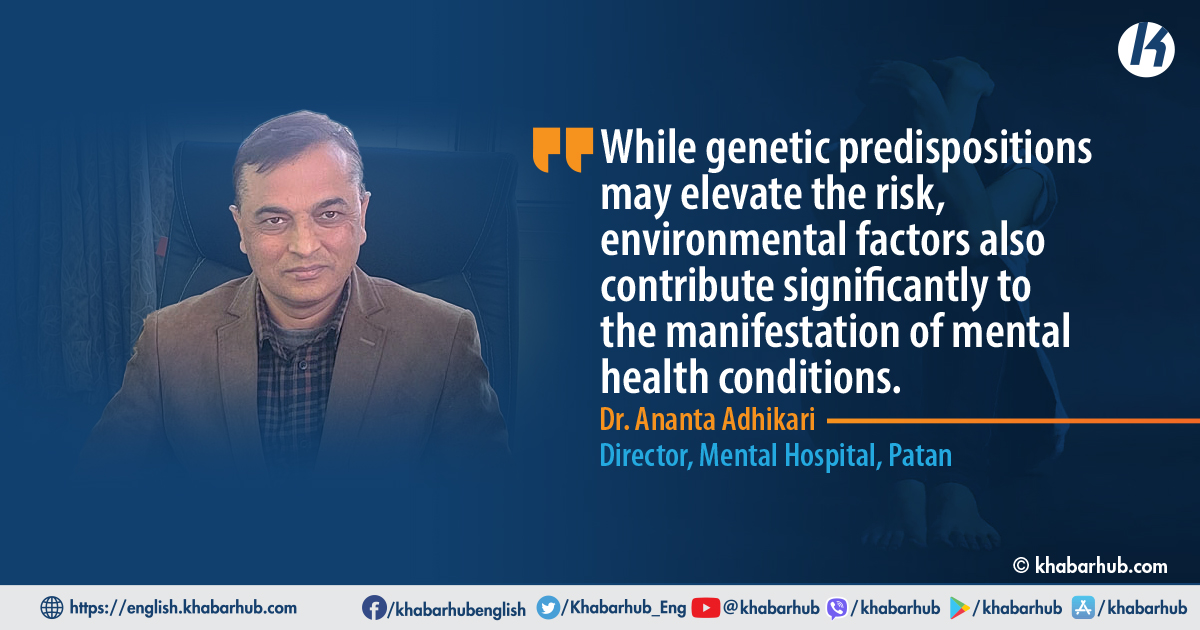Statistics reveal a surge in mental health cases in Nepal, particularly post the Covid-19 pandemic.
Patan, as a prominent mental health treatment center, witnesses a notable influx of patients grappling with intricate mental health issues.
In a conversation with Khabarhub, Dr. Ananta Adhikari, the Director of the Mental Hospital in Patan, shed light on the pressing concerns surrounding mental health in Nepal.
Addressing the pervasive nature of these issues, Dr. Adhikari emphasized how mental health problems transcend age, sparing neither children nor the elderly, men nor women.
Elucidating the concept of mental health, he underlined the complexities associated with the mind’s intricacies, making a case for considering mental health as integral to overall well-being.
When asked about the distinction between genetic and situational factors in mental illnesses, Dr. Adhikari elucidated the multifaceted nature of these conditions, citing a combination of biological, psychological, and social elements at play.
While genetic predispositions may elevate the risk, environmental factors also contribute significantly to the manifestation of mental health conditions. Excerpts:
Statistics show that the number of people with mental problems has increased in Nepal. What does your experience say?
Patan Mental Hospital serves as a central hub for treating complex mental health issues.
Particularly post the Covid-19 pandemic, there has been a noticeable surge in the number of individuals seeking treatment for mental health concerns.
Which age group or who has this problem more?
Mental health problems do not discriminate based on age or gender. They can affect anyone, be it children, teenagers, or the elderly.
However, the symptoms of mental illness can vary depending on the specific condition, with children often enduring long-lasting mental health issues originating in adolescence.
Is this a disease or a problem?
We consider it a health problem. Mental health is as integral to overall well-being as physical health.
Disturbances in thought processes, emotions, and behavior constitute deviations from the norm and should be recognized as health concerns.
How can it be distinguished as a genetic problem and a situational problem?
The etiology of mental illness differs from that of other physical diseases.
While genetics play a role, we also take into account various biological and psychological factors.
A combination of these factors contributes to the development of mental illness.
While a history of mental illness in one generation doesn’t guarantee its occurrence in the next, it does elevate the risk.
Social and psychological factors, in conjunction with genetic predispositions, increase the likelihood of developing mental health conditions.
What are the types of mental illness, and at what stage is it considered complex?
Our hospital primarily receives patients with severe mental illnesses, often referred from all corners of the country.
As a referral center, we encounter a significant magnitude of complex cases.
However, the specific conditions leading individuals to our facility vary, underscoring the multifaceted nature of mental health issues across the country.
What are the types of mental illness, and at what stage is it considered complex?
In our hospital, we primarily treat individuals with severe mental illnesses, often referred from various parts of the country, given our status as a referral center.
The sheer magnitude of mental illness across the nation is striking, with patients presenting diverse and complex conditions, distinct from other medical issues.
Is the treatment method different?
Treatment approaches do vary. While various methods, including medication, have proven successful in managing severe mental illnesses, the specific treatment plan depends on the nature of the condition and the individual’s needs.
What is the average pressure of patients who come in contact with the hospital themselves and who come to the treatment with their parents?
Patients grappling with severe mental health concerns often do not seek treatment independently.
It’s crucial for their families, friends, or neighbors to recognize the signs and assist in bringing them to the hospital.
Over time, with proper treatment and support, patients can begin recognizing the need for help and subsequently attend follow-up appointments on their own.
Have recent developments such as the pandemic, economic recession, unemployment, and poverty increased the number of patients seeking treatment?
Social factors indeed significantly influence mental health. Structural and societal changes, coupled with challenges like unemployment, poverty, and substance abuse, contribute to an increased susceptibility to psychiatric symptoms.
It’s imperative to address these underlying social issues to comprehensively manage mental health concerns.
In terms of treatment, what kind of patient is cured by counseling, and what kind of patient is cured by medicine?
Counseling can effectively aid individuals with early symptoms, stress-related concerns, and mild depression and anxiety.
However, for those with more severe conditions, combining medication with counseling proves most effective. Resolving the underlying social issues is crucial for sustainable recovery.
In recent years, mental health issues have become more complicated among children and teenagers. What could be the reason behind this trend?
Rapid societal changes, including the evolution of technology, altered family structures, and increased stress levels within families, have deeply impacted the younger generation.
Factors such as deteriorating interpersonal relationships, lack of emotional support, and exposure to negative influences contribute to rising mental health challenges among children and adolescents.
Are there no treatment methods to boost children’s confidence at the school level or within the family?
While there has been a surge in public awareness of mental health, more concerted efforts are necessary, particularly at the school level.
Schools must foster environments that promote positive mental health and provide access to counseling and support services.
Additionally, families should prioritize spending quality time with their children, fostering healthy emotional development from an early age.
Ignoring these crucial aspects can exacerbate mental health issues among children.
We often discuss the rise in suicides, but why do we overlook the surge in mental health issues?
Society tends to label suicide as a criminal act, often linked with cowardice, yet it’s crucial to acknowledge that mental health underpins such tragic incidents.
Statistics reveal that approximately 85 percent of suicides stem from various forms of mental illness.
Even within the remaining 15 percent of impulsive cases, the absence of sound mental well-being is apparent.
Rather than stigmatizing suicide, open discourse and timely mental health interventions can significantly mitigate the risk of such incidents.
What criteria determine if someone is facing a mental health problem?
Certain types of mental illnesses exhibit recognizable symptoms.
Prolonged feelings of depression, persistent loneliness, unexplained guilt, and suicidal thoughts, without any physical ailment detected upon examination, may indicate symptoms of depression.
Similarly, symptoms related to anxiety include irrational fear, increased heart rate, and visible changes in facial expressions, which are often recognized by the individuals themselves.
Severe paranoia leading to unwarranted fear and social withdrawal signifies a critical mental health issue, especially if there’s a sudden shift in behavior and thinking from the individual’s usual demeanor.
Is the government focusing on enhancing the capacity of hospitals dealing with mental health issues? What is the current capacity of your hospital?
While substantial progress has been made in addressing other healthcare concerns, mental health facilities remain relatively underdeveloped.
Currently, our hospital, the central mental health facility, operates with 50 beds and an active outpatient department.
However, the number of psychiatrists is limited, and the existing infrastructure has not undergone significant expansion since 2046.
The resultant strain often necessitates referring patients elsewhere, contributing to additional pressure on the system.
Are there inadequacies in terms of manpower, technology, and physical infrastructure within the hospital?
Although we face constraints in terms of inpatient beds, our hospital has adopted advanced technologies and treatment modalities.
Patients receive prompt psychiatric evaluations, and we have integrated modern methods into our counseling and medication regimes.
Our primary challenge lies in the inability to accommodate all patients requiring admission.
Is there an issue with budget allocation priorities? Has mental health not been prioritized by the state?
Mental health receives less than 1 percent of the overall health budget in Nepal, signaling a significant lack of emphasis on this critical aspect of healthcare.
The insufficient budget not only neglects mental health specifically but also indicates an overall disregard for the discourse and prioritization of mental health issues.
Are there plans to establish a separate department for children, drug addicts, and similar patients, or will the existing approach continue?
Currently, Nepal has a limited number of specialists dedicated to children and adolescent mental health.
Initially, treatment for mental health issues in children occurred at Kanti Hospital, primarily on an outpatient basis.
Recently, an outpatient department focusing on child and adolescent mental health, equipped with ten intimate beds, commenced operations at our facility, supported by an NGO.
Emphasizing the significance of promoting mental health in children, initiatives at home and school play a pivotal role in preventing and managing these challenges.









Comment